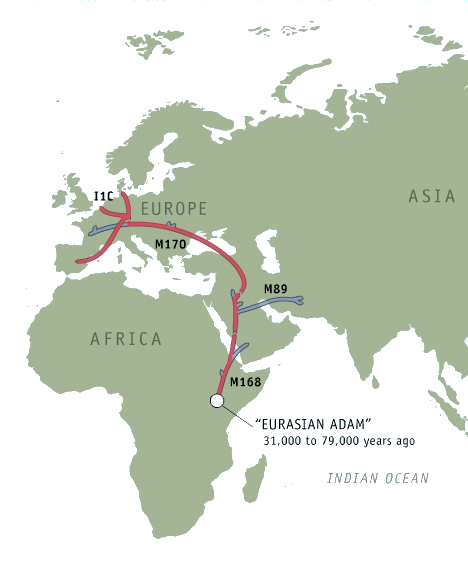The Journey Out of Africa
M168:
Your Earliest Ancestor

Fast Facts
Time of Emergence: Roughly 50,000 years ago
Place of Origin: Africa
Climate: Temporary retreat of Ice Age; Africa moves from drought to warmer temperatures and moister conditions
Estimated Number of Homo sapiens: Approximately 10,000
Tools and Skills: Stone tools; earliest evidence of art and advanced conceptual skills
Skeletal and archaeological evidence suggest that anatomically modern humans evolved in Africa around 200,000 years ago, and began moving out of Africa to colonize the rest of the world around 60,000 years ago.
The man who gave rise to the first genetic marker in your lineage probably lived in northeast Africa in the region of the Rift Valley, perhaps in present-day Ethiopia, Kenya, or Tanzania, some 31,000 to 79,000 years ago. Scientists put the most likely date for when he lived at around 50,000 years ago. His descendants became the only lineage to survive outside of Africa, making him the common ancestor of every non-African man living today.
But why would man have first ventured out of the familiar African hunting grounds and into unexplored lands? It is likely that a fluctuation in climate may have provided the impetus for your ancestors' exodus out of Africa.
The African ice age was characterized by drought rather than by cold. It was around 50,000 years ago that the ice sheets of northern Europe began to melt, introducing a period of warmer temperatures and moister climate in Africa. Parts of the inhospitable Sahara briefly became habitable. As the drought-ridden desert changed to a savanna, the animals hunted by your ancestors expanded their range and began moving through the newly emerging green corridor of grasslands. Your nomadic ancestors followed the good weather and the animals they hunted, although the exact route they followed remains to be determined.
In addition to a favorable change in climate, around this same time there was a great leap forward in modern humans' intellectual capacity. Many scientists believe that the emergence of language gave us a huge advantage over other early human species. Improved tools and weapons, the ability to plan ahead and cooperate with one another, and an increased capacity to exploit resources in ways we hadn't been able to earlier, all allowed modern humans to rapidly migrate to new territories, exploit new resources, and replace other hominids.